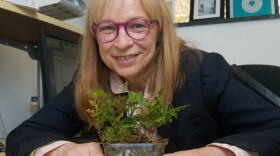
Joe Palca
Joe Palca is a science correspondent for NPR. Since joining NPR in 1992, Palca has covered a range of science topics — everything from biomedical research to astronomy. He is currently focused on the eponymous series, "Joe's Big Idea." Stories in the series explore the minds and motivations of scientists and inventors. Palca is also the founder of NPR Scicommers – A science communication collective.
Palca began his journalism career in television in 1982, working as a health producer for the CBS affiliate in Washington, DC. In 1986, he left television for a seven-year stint as a print journalist, first as the Washington news editor for Nature, and then as a senior correspondent for Science Magazine.
In October 2009, Palca took a six-month leave from NPR to become science writer in residence at The Huntington Library, Art Collections, and Botanical Gardens.
Palca has won numerous awards, including the National Academies Communications Award, the Science-in-Society Award of the National Association of Science Writers, the American Chemical Society's James T. Grady-James H. Stack Award for Interpreting Chemistry for the Public, the American Association for the Advancement of Science Journalism Prize, and the Victor Cohn Prize for Excellence in Medical Writing. In 2019, Palca was elected to the American Academy of Arts and Sciences for outstanding achievement in journalism.
With Flora Lichtman, Palca is the co-author of Annoying: The Science of What Bugs Us (Wiley, 2011).
He comes to journalism from a science background, having received a Ph.D. in psychology from the University of California at Santa Cruz, where he worked on human sleep physiology.
-
Summer living is supposed to be easy — school is out, the days are long, the traffic eases. But it's not all diving boards and lemonade: Summer can throw us some curveballs, too. NPR kicks off its Summer Science series with tips from a fire scientist on how to build the perfect campfire.
-
Summer living is supposed to be easy — school is out, the days are long, the traffic eases. But it's not all diving boards and lemonade: Summer can throw us some curveballs, too. NPR kicks off its Summer Science series with tips from a fire scientist on how to build the perfect campfire.
-
Companies making genetically modified animals face a regulatory morass in this country. It's not always clear which federal agency has responsibility for regulating a particular animal, and even when one agency does take the lead, the approval process can drag on for years.
-
In 1543, when Nicolaus Copernicus made the astounding claim that Earth revolves around the sun, not the other way around, his ideas were met with scorn. "It went against everything that your senses tell you. It went against common sense," says author Dava Sobel, who wrote a new book about the astronomer.
-
Amborella is the first known flowering plant and, like the platypus, a genetic dead end. Selaginella's relatives are the fossils in fossil fuel. Now, scientists are studying the genes of these plants, looking for clues about evolution and compounds that might be applied to medicine or agriculture.
-
Amborella is the first known flowering plant and, like the platypus, a genetic dead end. Selaginella's relatives are the fossils in fossil fuel. Now, scientists are studying the genes of these plants, looking for clues about evolution and compounds that might be applied to medicine or agriculture.
-
This year's Nobel Prize for chemistry has been awarded to three men who pioneered better ways to make complex carbon-based molecules in the laboratory. They are Richard Heck of the United States, Akira Suzuki of Japan, and Ei-ichi Negishi, a Japanese citizen who spent most of his career in the United States.
-
American Richard Heck and Japanese researchers Ei-ichi Negishi and Akira Suzuki won the 2010 Nobel Prize in chemistry on Wednesday for developing a chemical method that has allowed scientists to make medicines and better electronics.
-
The world's largest prime number clocks in at nearly 13 million digits. It's a type of number called a Mersenne, and mathematicians are using the Internet to outsource the computing power to find them, number-crunching away to find one that's even larger.
-
The work of Charles Darwin, who was born 200 years ago Thursday, transformed our understanding of life on Earth and underpins the whole of modern biology. His work challenged just about everything the Victorians believed in.





